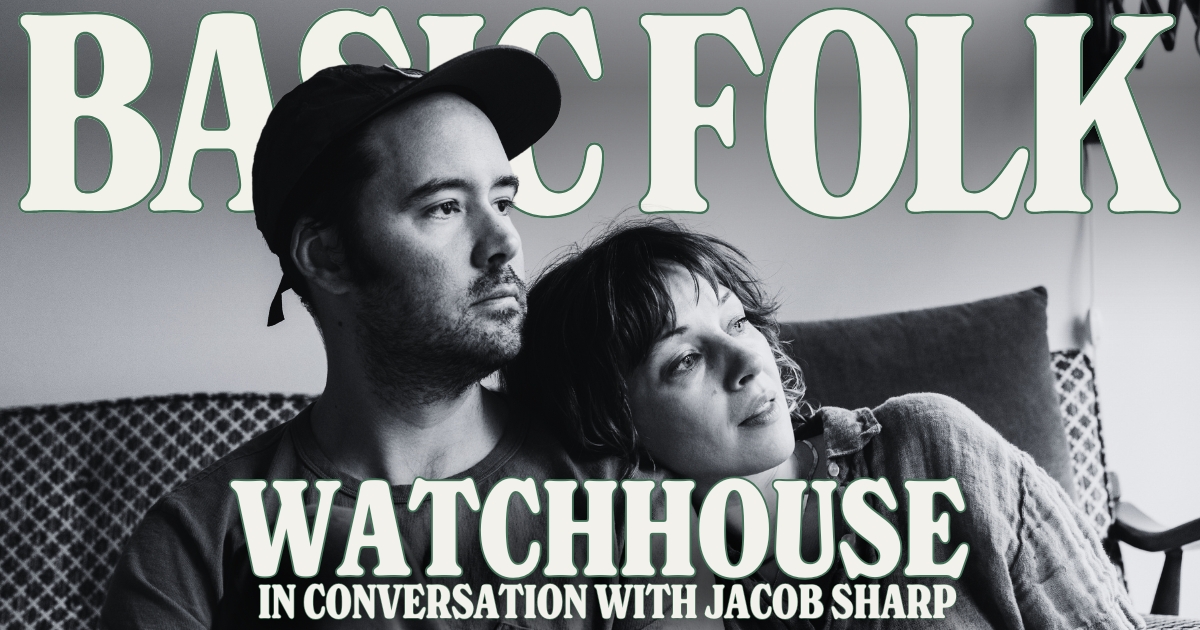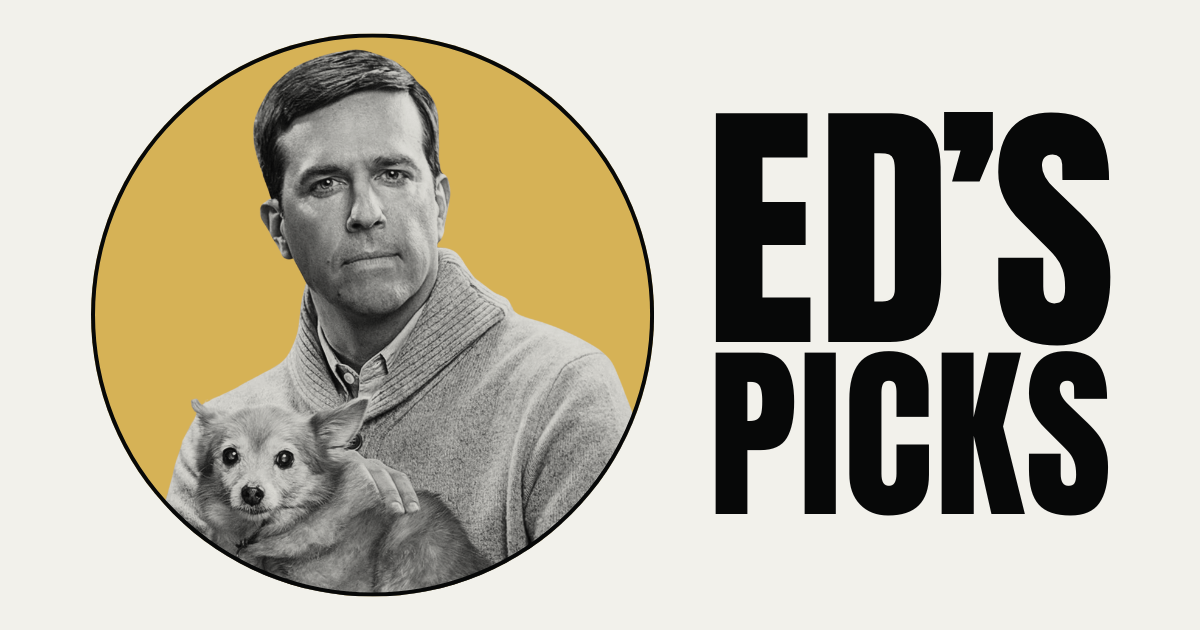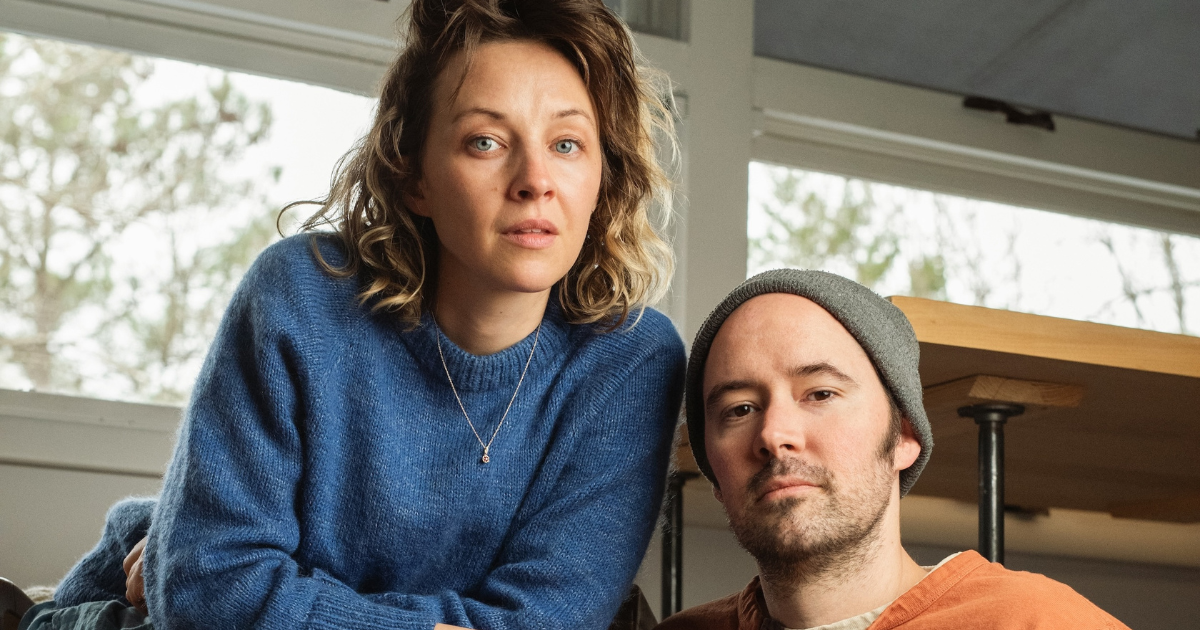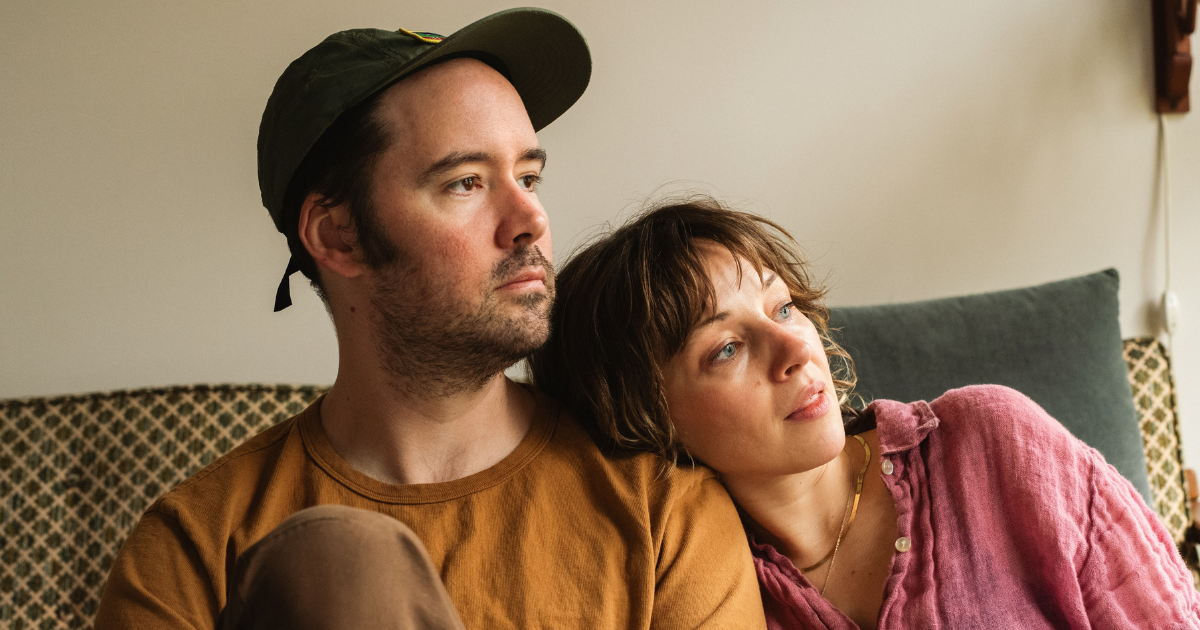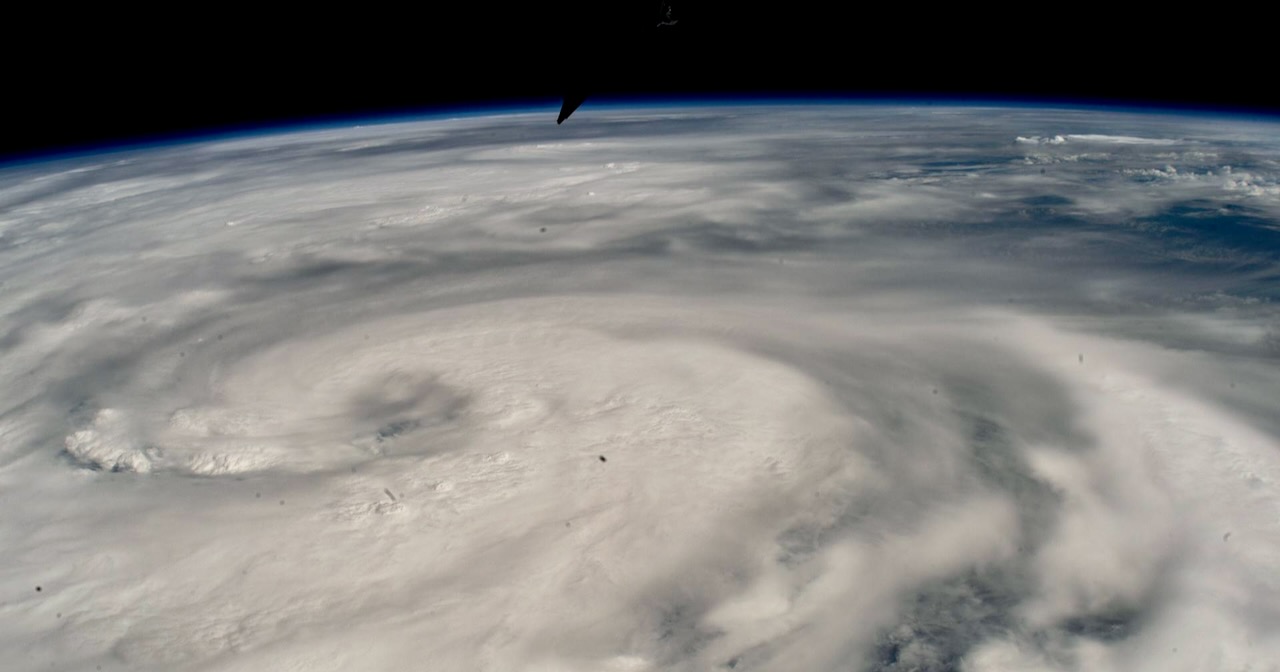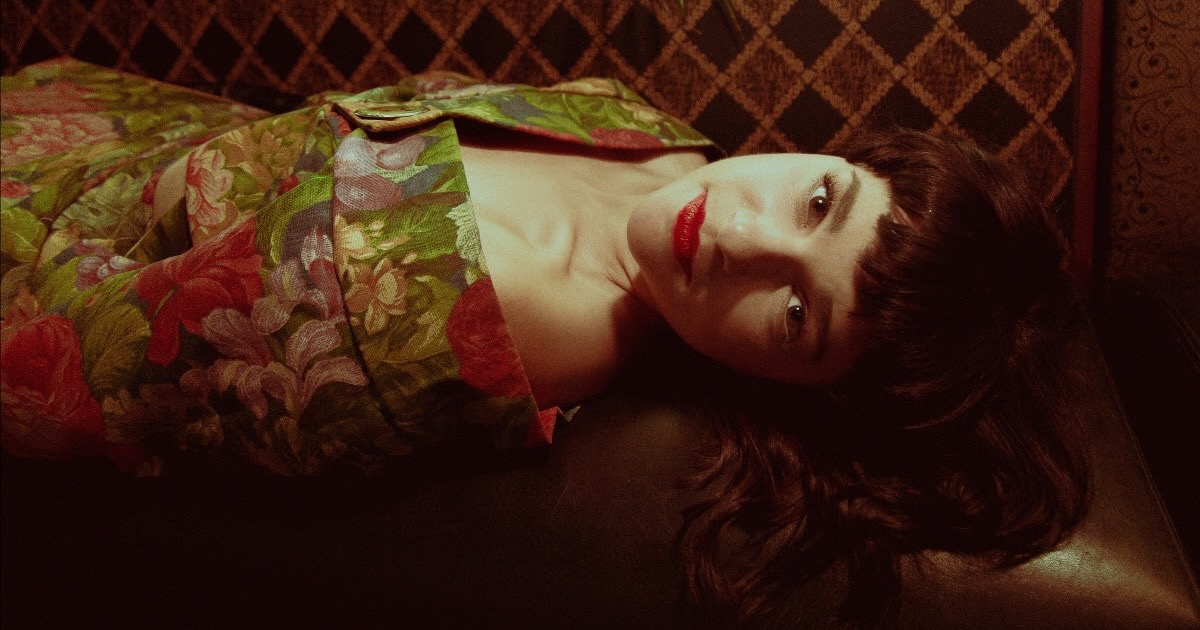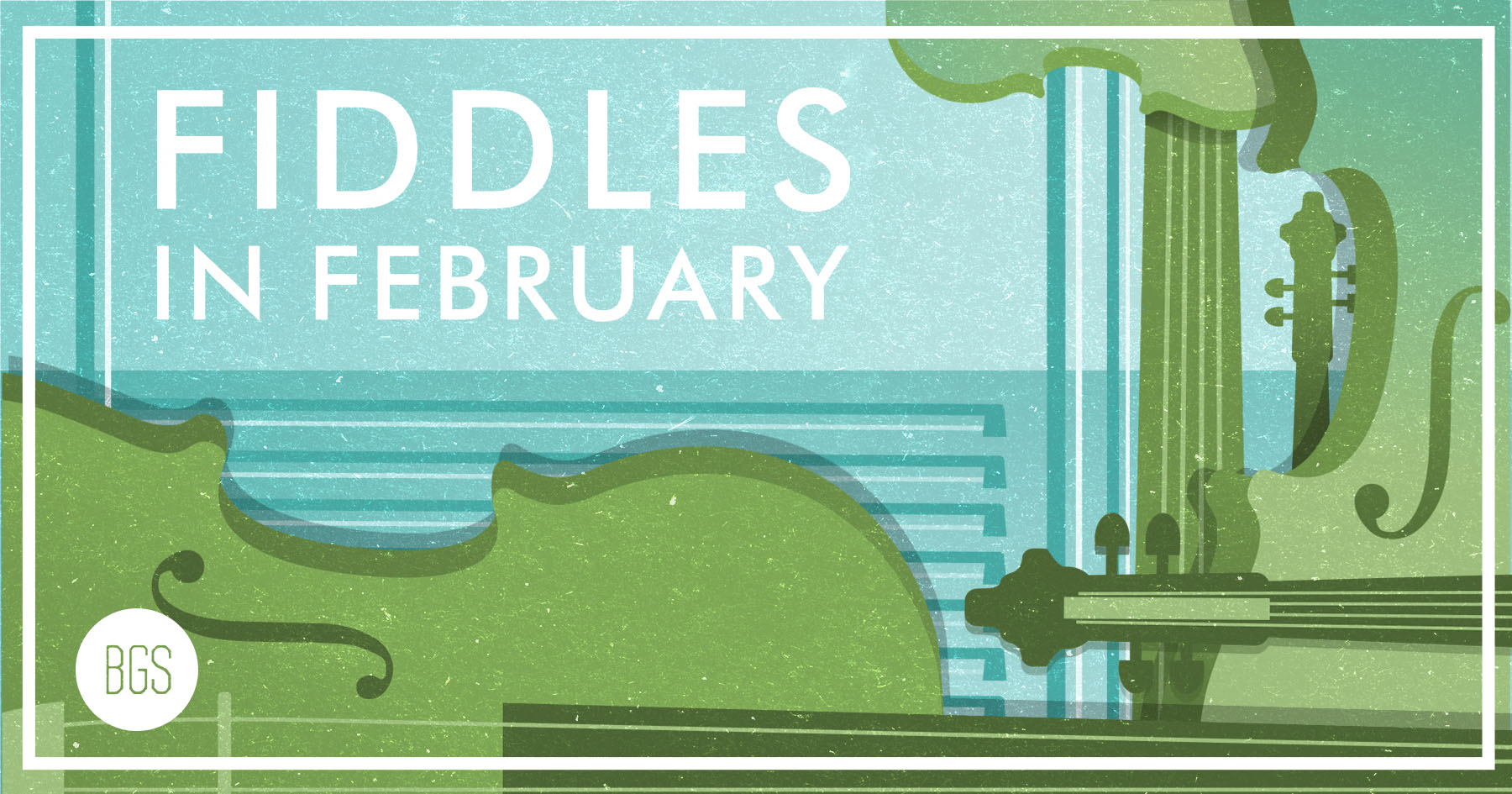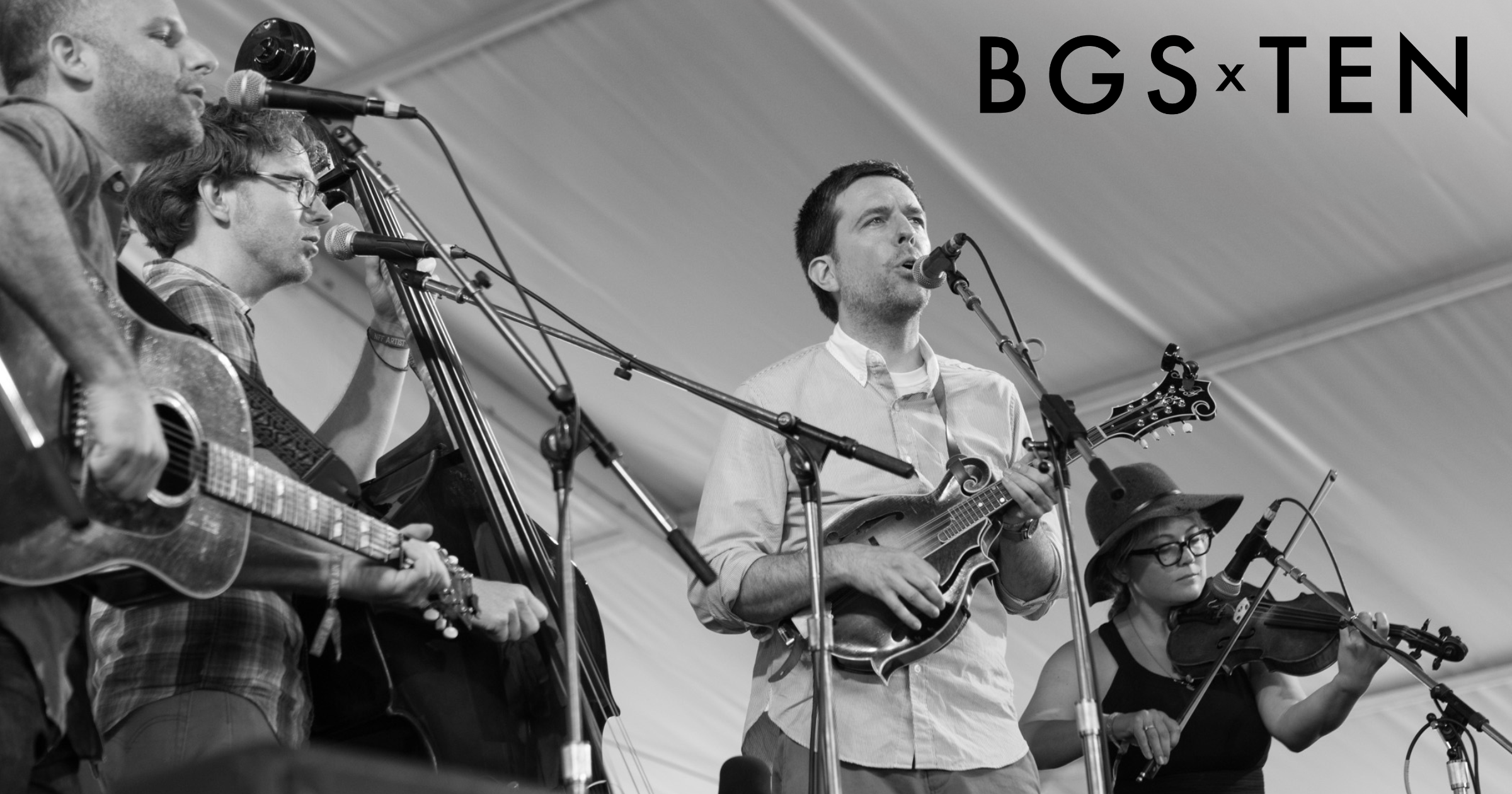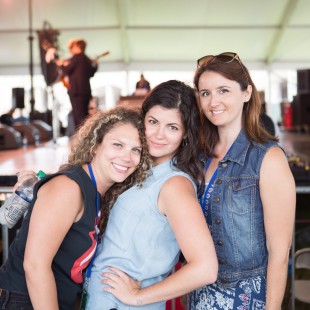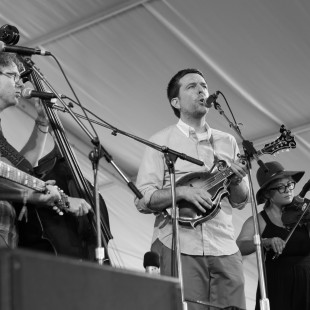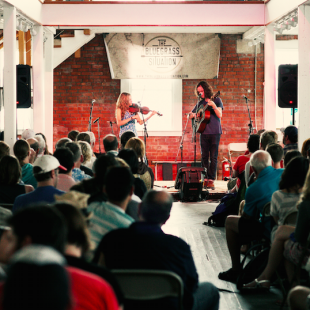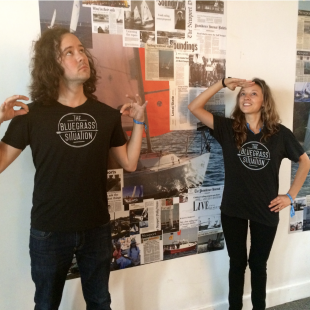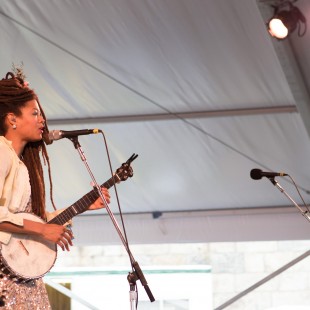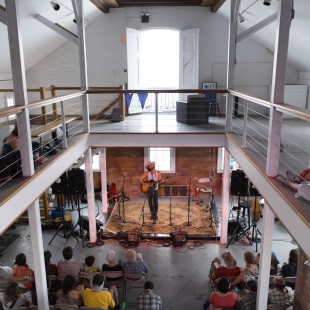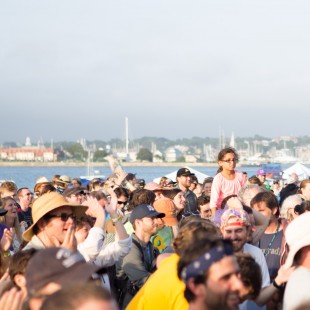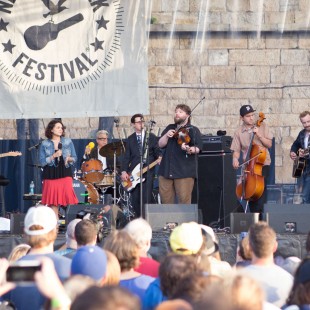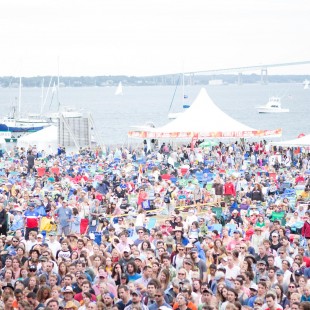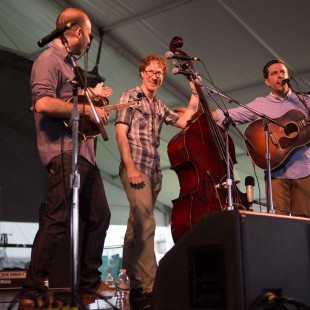Tag: Watchhouse
Basic Folk: Watchhouse
Oh, WOW! A bonus, surprise episode with Watchhouse? Yes! And it is a treat.
We are pleased to have Jacob Sharp of Mipso as our guest host in conversation with his friends Andrew Marlin and Emily Frantz of Watchhouse, talking about their new studio album, Rituals. The record was co-produced with Ryan Gustafson of The Dead Tongues and finds the North Carolina duo exploring themes of identity, awareness, and evolution.
LISTEN: APPLE • SPOTIFY • AMAZON • MP3
We are so pumped about this pairing on the pod! We are also huge fans of Jacob’s music – with Mipso as well as in his solo endeavors – from his attitude to his vibes. Not to mention how super talented he is. This is a really fun conversation between some old pals. Jacob was based in California, but now moving back to North Carolina, so it’s cool to have a little homecoming for these North Carolinians. Thanks for listening!
Find more of our Artist of the Month content on Watchhouse here.
Photo Credit: Jillian Clark
All Kinds of Country
Editor’s Note: Each issue of Good Country, our co-founder Ed Helms will share a handful of good country artists, albums, and songs direct from his own earphones in Ed’s Picks.
Born and raised in a border town in Texas, singer-songwriter William Beckmann perfectly illustrates how Mexican folk, Tejano music, and country have always been closely intertwined. Latin folk is Americana; mariachi and Norteño are country. With Good Country like his, that connectedness feels intuitive – and obvious. Beckmann’s new album arrives June 20.
Rhiannon Giddens & Justin Robinson, founding members of revered string band the Carolina Chocolate Drops, reunite on a new old-time album, What Did The Blackbird Say to the Crow, which celebrates North Carolina repertoire, fiddle, banjo, and front porch pickin’. I’m excited to join them both – and many other special guests like Steve Martin, Amythyst Kiah, Leyla McCalla, and more – at the Hollywood Bowl on June 18 for a special one-night-only edition of their Old-Time Revue.
“Uneasy listening” or “bluegrass soul,” whatever you call their style of music, the SteelDrivers are a bluegrass institution. Their new album, Outrun, is their first with Sun Records, an excellent label match for a group that combines bluegrass, blues, country, and soul with music that’s equally at home in Nashville, Memphis, Muscle Shoals, and beyond. Love this band of ringers!
There’s a new sort of Americana/country/Gen Z folk brewing between social media and music cities like Nashville, Chicago, and LA – and Jack Van Cleaf is at the center of its rise. Is it alt-country? Is it contemplative bedroom folk? Is it indie rock? Is it singer-songwriter Americana? It’s all of the above. Check out his latest LP, JVC, to discover your own terms for his striking style.
My old pals Andrew and Emily were a pick last year when they guested on “Pink Skies” on Zach Bryan’s smash hit album, The Great American Bar Scene. Now they’re back with a full-length album of their own, Rituals, out today! We’ve been covering and collaborating with Watchhouse for over a decade, so stay tuned for more celebrations of the new record coming soon to BGS and Good Country.
Want more Good Country? Sign up to receive our monthly email newsletter – and much more music! – direct to your inbox.
Photo Credits: William Beckmann by Connor Robertson; Rhiannon Giddens & Justin Robinson by Karen Cox; The SteelDrivers by Glenn Rose; Jack Van Cleaf by Joseph Wasilewski; Watchhouse by Jillian Clark.
Watchhouse Found New Rituals Amid the Push and Pull of Change
Chances are you’ve cultivated a few personal routines to help you navigate the world: one for daily life, one for weekly, monthly, and so on. There’s also likely a handful of individual habits that affect how you choose to go about your routine. The former, at times, can influence the latter, fitting within each other like a pair of nesting dolls, adjacent and similar in their roles.
Then there are rituals. Though these three recurring sets of actions – routines, habits, and rituals – would seem like easily overlapping bedfellows, rituals carry an intrinsic quality the other two lack: mindfulness. Rituals bear a sense of intention like the other two, but it’s often coupled with an element of symbolism or custom. It’s not just a matter of doing something and saying it’s done; there are other connotations or expectations that may influence why doing it matters.
Holding this notion in mind, it’s Rituals that Andrew Marlin and Emily Frantz of North Carolina duo Watchhouse have decided to name their new album. Through its 11 tracks, the married musicians posit an abundance of questions and actions, their contemplations placed in settings that are as clear as a simple back porch and as abstract as a space “through the looking glass,” “beyond this to and fro.” Settings that exist outside of not only any kind of routine, but separate from time and space all together.
Though Watchhouse’s new writings don’t seem to present rituals in their conventional form, the title still feels wholly appropriate. Marlin and Frantz’s reflections, wistful pining, and open-ended ruminations don’t lead to a sense of clear, expected structure that rituals would traditionally provide, but each song is lined with an abundance of intention, mindfulness, and hope for various outcomes. Sometimes these are overtly stated – Oh, I’m dreaming of a life with you in the sun/ And I hope our time together has only just begun… – and sometimes they are dressed in metaphors: Go fire your cannonball, go and fire away/ When the ashes fall we’ll start a brand new day.
There are defined ideas that Watchhouse put forth on the album: identity and awareness, the distinction between patterns and truths, how to develop a positive relationship with change, and what it means to evolve. All the same, while our internal responses to these songs may change over time, the very act of revisiting, replaying, and reconsidering their meanings, and how we are affected by them, can be a form of ritual in its own way.
Amid an extensive tour that will take them all over the U.S. and into Canada through summer and fall, Watchhouse spoke with BGS about their collaborative dynamic, how their individual artistic instincts influence the direction of a song, and the prevalence of duality in the album – as well as in their lives.
It’s been about four years since your last album and eight years since both your lives changed from bandmates to family. Given that Rituals focuses on patterns and the perception of change on our lives, how has the ever-growing longevity of your union in marriage — and all the ways marriage transforms a relationship on its own — changed the way you perceive and interact with the music making process?
Andrew Marlin: When you hit the road and join forces with other people to play music, it’s kind of like stepping outside of the norm and stepping outside of the daily life to go up there and almost take on a role or take on a character in order to get inside the music. You kind of just forget everything that the day often requires of you, because all of a sudden those requirements aren’t there. It’s just the stage and the music and the people that are there rooting for you to go deep, you know?
I think finding that zone with Emily has had its challenges in the past, because we’re so closely tied to each other. We raise kids together and we live together, and so doing all this traveling together and playing music together too, it makes it harder – or made it harder for me at the beginning, I think – to leave the daily routine and expectations behind on stage and just shed all of that and take on that character. It’s one thing to look at your bandmates’ eyes and get a little nod or whatever’s happening during the music. It’s kind of like this understanding of, “I’m not here right now. This is just me playing music.”
Getting to that zone with Emily, now that we’re 16 years into it, has taken a while to get to that point to where it’s an acceptance of all of it, instead of just leaving things behind to get on stage. It’s like we’re carrying all of it with us at all points in time. People that come to see us get a real and honest version of ourselves, trying to go deep in the music but also being completely aware of each other too.
Emily Frantz: I was just thinking about how much things changed in 2020 and 2021, living our mundane day-to-day lives in our house, and the transition back into being on the road again and touring. We’ve obviously been doing that for a few years now since COVID, but that experience made us relearn what the relationship is between our daily life at home and touring and [figuring out] how can they coexist in a healthy way.
Ironically, the album’s opening track, “Shape,” avoids the traditional shape or structure of a song (all verses, no chorus) while the actual narrative of the song embraces ideas that lean into a sense of purgatory and a nebulous state of being — the very opposite of what would help establish a sense of shape, boundaries, identity, direction, patterns, or truths. What were the mental and emotional motivations that inspired you to take the song in this direction?
AM: It’s like establishing the shape or the pattern in order to separate yourself from it. That’s what a lot of those verses are doing, kind of outlining the things that often make me feel like I’m in a box and I’m trying to get outside of that box. The only way to do it – because there’s no real form to it – is to imagine the parameters, imagine the spaces that it ends up kind of confining you in, in order to step outside of those [boxes]. I think that was the intention with “Shape.”
EF: And the way that “Shape” came into its final form, at least final the way it appears on the record, was a lot of the things that you said about it: It didn’t ever really conform and it got rearranged and had things added and taken away from it so many times, a lot more so than other songs. But it always did feel like the backbone of this record in a lot of ways, which is why it felt really right as the opening track of this record.
AM: If there was a shape to define that song, I’d say it’s a spiral.
View this post on Instagram
How have you fit rituals into your lives and have they helped you maintain a sense of stable continuity as a family and as musicians?
AM: I feel like since having kids, the day has taken so much more form. Because I think that, and Emily [is] really brilliant about this, giving structure to the day is super helpful for them. So that they don’t have to wonder what’s happening, so that they can really pay attention to what is happening. I’ve watched both of our kids blossom in that environment. Emily’s really good about helping to create that and make sure we stick to it. Carrying that on the road has been really helpful, too and something that I didn’t realize I was going to benefit very much from. Because I definitely, when left to my own devices, am like a sheet left out to dry – just flapping in the wind. To have a little bit of structure to the day, and have to enter into these mental zones with the kiddos, has added a lot of mental structure to my existence. I think that’s the biggest thing for me.
And within that, it’s about realizing what the day actually requires of me, instead of what I imagined today to be expecting of me. Finding those real anchors and a little more gravity to the things I’m working on have helped me shed old expectations of myself and what I think I’m supposed to be doing. I think that’s what led us to be okay with changing the band name and changing up some of the sounds and approaching this thing we’ve been doing for a long time in a whole new way.
EF: I think the thing that we are [focusing on] 16 years in is finding where the balance is between freedom and artistic expression, and also just daily life and figuring out how to have those two things like coexist and make each other better and not be in a constant sort of push and pull.
The first verse in “Beyond Meaning” is intriguing. The statement of your “gentle” disposition is nice, but its seemingly conditional nature gives pause — particularly when considering that life is noisy and out of our control more often than not. What is it that you’re trying to say about your own identity and awareness of how you cope with the noise and bustle of everyday living?
AM: I feel like what I was getting at is to view it as though it’s external noise. But it’s actually internal noise. That’s often the thing that keeps me from my peace and keeps me from being gentle. It’s my own defenses and my own self-consciousness that end up creating all of this noise. It paints the external noise in a negative light. When I can control that and remember to keep my own defenses at bay and be open and actually present, the idea that maybe this external noise is not a malicious one keeps me gentle and then often what comes from that is a gentle interaction. So it’s more about controlling the internal noise in order to actually experience the external factors.
Out of the 11 songs on the album, Emily is the primary vocalist only for “Firelight.” Why was Emily the right fit to sing the story of this one song? And more broadly, what went into your shared thought process on when, and for how long, you two would sing together? Is it a purely harmony and arrangement-based decision, or do the emotions of a song influence how each vocal arrangement is structured?
EF: A lot of times it can be pretty cut and dry. If we’re deciding who should sing lead on a song, it might just have to do with the range or the key, where we think it sounds good. Sometimes that plays into it maybe even more than the lyrics or the subject matter. With Andrew doing the songwriting, he’s always been more of the primary lead vocalist. Oftentimes, by the time we’re arranging a tune and finding out how we want to present it, it’s very cemented in his voice. But then a lot of times, there will be tunes that we’re struggling with and we’re not quite finding it. By switching out who’s singing, it reframes the whole song and allows us to not just change the lead vocalist, but to find a whole different zone for the song in terms of what we hear and how it gets arranged and recorded. That was the case with “Firelight.” We had so many different versions of that song over the years leading up to recording – different time signatures, different instrumentation – and that was one of the last ones that came together for this album. Most of it got done after the initial tracking session because we were searching on it for a long time and I think I like it more and more the longer I sit with it, the more I hear it.
AM: Often people do want to know why Emily’s not singing more tunes or why the roles are what they are. But I think it’s really important to shine a little light on what Emily does behind the scenes when she’s not singing. The way she plays rhythm and plays violin or whatever instrument she’s on, it ends up being this anchor for everyone in the band. The way that offers complete structure to what we’re doing and allows everything else to sway around that a little bit, I feel like even when she’s not singing, her musical voice is such a strong presence in the music. I’ve heard her say this before, like when she’s playing violin, she’d rather not sing lead because it’s almost like having to sing with two voices. That became part of the structure of what we’ve been doing all along, not just with the lead vocal. The feel of the song and the rhythm and the chord structure and the flow of it all often is hinged on what Emily ends up doing. I think that’s just as important as her taking a lead vocal.
EF: I’ve really, over the years of us playing music together, come around to enjoying singing lead when we find the song that feels good in my range. But for the most part, I’d rather be singing harmony to Andrew and that definitely brings me just as much, if not more, fulfillment than singing lead on a song.
“Endless Highway (Pt. 1)” and “Sway / Endless Highway (Pt. 2)” leave a much heavier state of reflection than that of “Patterns,” the song you chose as the album’s finale. Were the lighter tone of the music and the lyrics a driving factor for why these last three songs are in this order? Did you want to avoid an ending that leaves the listener with a more uncertain emotional state?
AM: I’ll start off by saying Ryan Gustafson, who produced this record with us, actually ended up coming up with this track order. Having not listened to it that way and then taking Ryan’s perspective on it, it was like being able to listen to these songs in their entirety for the first time. All of a sudden, I was getting feelings from these recordings that I hadn’t gotten yet.
“Endless Highway (Pt. 1)” is a heavier song and talks about a really traumatic event that Emily and I went through and that long drone at the end of it kind of dances around the dread of that. Then into “Sway,” it’s more of a coming out of that [feeling]. How do we peek our heads out of the hole once we’ve gone down and slowly crawl back out? To finally get into “Endless Highway (Pt. 2),” where it feels like a real revelation and a real triumphant part of the record? So, you get to the top of the mountain on this song. But I do believe that while those revelations come, we get to the top of those mountains, everything’s clear, and there’s so much lightness and clarity around us, we still have to wake up the next morning, make coffee, make breakfast, get kids to school, go and run errands and carry that little mountain of revelation with us everywhere we go.
I think that the heaviness and the profoundness of that idea ends up giving way to these smaller, mundane parts of our life. That’s what “Patterns” feels like to me. It’s an admission that if we can hold on to those little revelations and the clarity they offered us, hopefully it’ll keep us light by offering us that little reminder of hope.
EF: Going back to what Andrew was just saying about having these big events or these heavy, emotional things happen, and then having to go on with our lives, and the push and pull of that – there’s frustration and beauty in it. I love the order of those [last few] tracks, because I feel both the “Endless Highways” and “Sway” are songs that were written in the middle of this album being written and there’s a lot of anguish from a lot of different sources in those songs. And then “Patterns” was the last song that was written for the album before we recorded it, so it feels like it has a certain clarity to it. Going down in the trench and making your way back up, even though it’s still really just posing a lot of the same questions [as the beginning of the album], but from a more settled state of mind.
What truths about yourselves and how you view the world have you discovered and accepted since finishing Rituals? How many of the questions you’ve posed through these songs do you feel you’ve managed to settle on answers for?
AM: I don’t think I would often look closely enough at how I was making a person feel, as much as I would look at the way the person was. I think that’s becoming more of my truth these days, just to trust that showing up open-minded with awareness and consciousness, focused on experiencing rather than projecting, is probably the closest to any truths that have come out of writing these songs and getting to the end of this record. The takeaway is that it’s not like we found answers, necessarily.
EF: It’s all just a pursuit, always.
AM: You know, it’s not always about finding answers. It’s about finding out–
AM/EF: It’s figuring out what the question is.
Photo Credit: Jillian Clark
Explore more of our Artist of the Month coverage here.
Artist of the Month: Watchhouse
What picker doesn’t dream of a bluegrass jam meet-cute? For Andrew Marlin and Emily Frantz, a fateful inauguration day jam in 2009 not only introduced each to their lifelong beloved, but also sowed the seeds for a renowned roots duo – Watchhouse.
In a radio interview with WNCW, Marlin recalls the pair’s chemistry felt immediately apparent, with Frantz’s harmonies lending new life to The Carter Family standard “Bury Me Beneath the Willow,” one of Marlin’s jamming mainstays at the time.
The North Carolina-based duo got right to work, gigging across the backyards and front porches of their Chapel Hill community. Both multi-instrumentalists and vocalists in their own right, Marlin took on the role as primary songwriter/guitarist/banjoist/mandolinist/vocalist, with Frantz augmenting via fiddle/vocals/guitar throughout their articulate arrangements.
By 2011, the pair had released two full-length albums, Quiet Little Room (2010) and Haste Make/Hard Hearted Stranger (2011) under the name Mandolin Orange. Though they would later outgrow the moniker, Mandolin Orange utilized just two instruments to primarily sculpt the duo’s sound – the mandolin and the orange fiddle. With lyrical depth and sensitive instrumental synastry, they established themselves as adept songweavers in the roots scene.
The year 2013 saw the pair signed to Yep Roc Records, a celebrated North Carolina label, starting a distinct shift in their visibility and distribution. Their debut release under the new label that year, This Side of Jordan, earned attention from an expanding national audience, with NPR deeming the record “effortless and beautiful.” They would go on to release three more albums with Yep Roc before shedding the Mandolin Orange title in 2021. Having conceived of the name Mandolin Orange in their early twenties, Marlin remarked that the shift to Watchhouse signaled leaning into intentionality, as the two had “long been burdened by the dichotomy between our band name and the music we strive to create.” As their palates developed, the sense of intimacy in Marlin’s songwriting ripened over time. Their 2019 release, Tides of a Teardrop, an album brimming with tenderness, honesty, and grief, reckoned with Marlin’s mother’s early death.
Propelled to rename the project with similar authenticity, the name Watchhouse emerged after a year of percolating during COVID quarantine. Their subsequent self-titled album, Watchhouse (2021), centered a sonic expansiveness that reached past the confines established and upheld by their moniker of old. Additionally, the duo gained full creative control as their own label, Tiptoe Tiger Music, released the record, partnering with Thirty Tigers for distribution. Layered with novel tones that veer into the vicinity of pop, Watchhouse maintains its makers’ telltale warmth and intimacy while dressing the project in a new glow.
Notably, many of these evolutions occurred in tandem with the birth and growth of Marlin and Frantz’s daughter, Ruby, who was born in late 2018. When asked by BGS back in 2021 about the influence becoming a parent has had on his songwriting, Marlin responded, “I would love to help pave a safe path for my daughter and hopefully inspire some of our listeners to be kind and open up a kind world for her to go into. And that’s made its way into my perspective even in songs where I’m not talking about it.” The songs grapple with a wide range of muses, from parenthood to life during climate change, remaining buoyant despite the weightiness of it all.
That tenor of pondering accompanies Watchhouse into the release of their 2025 album, Rituals, which entered the world on May 30 via Tiptoe Tiger Music/Thirty Tigers. The provocative 11-track collection, true to the duo’s thematic strengths, interrogates the circular nature of humanity, inspecting the relationship between steadfast, cyclical ritual and ever-evolving change.
Of the title track, Marlin states in the song’s press release, “When my circumstances change, who I think I am changes, and then my established rituals and patterns no longer serve me. This song is a leap of faith, a message to anyone feeling like they are struggling to leave a former self behind. We cement ourselves through constant sharing and projection, and it feels like it’s in direct conflict with staying present and evolving. ‘Rituals’ is a song of empathy, both for myself and for others – an acknowledgment of the celebrated nobody in us all.”
Throughout the album, Marlin’s songwriting investigates these themes, brought to life by a stunning range of vocal and instrumental performances, from harmonium to pedal steel to drum kit. Frantz and Marlin strike a vocal blend as warmly entangled as ever; listening to the two sing in harmony feels akin to being mesmerized by a crackling campfire dancing beneath the starlight. Frantz even graces listeners with a rare display of lead vocals on the track fittingly called “Firelight.”
In 2019, following the release of Tides of a Teardrop, Frantz told The Boot, “I like to play more of a supportive role, as someone who’s not doing much of the songwriting and someone who likes to sing harmony more so than lead. It’s always been what I’ve gravitated to – trying to complement the song as honestly as I can without taking too much ownership over it.”
“Firelight,” therefore, feels like a glimmering gem, a highly yearned-for showcasing of Frantz’s lilting vocals. Her timber and sway sift thoughtfully through Marlin’s lyrics of memory and connection, further infusing the album’s universe with a soft haze of timelessness.
The album art adds yet another dimension to these motifs. Its subtle depiction of domestic ritual (clotheslines, coffee machines, mugs, pots, etc.), emulates the familiar tenderness with which Watchhouse posits their profound inquiries. Reckoning with the simplicity of this imagery provokes listeners to explore the songs’ ponderings in the mundane alongside the larger overarching picture. Grown with an immense deal of care and attention, Rituals is a sonically transcendent record that begets deep inner stirrings within its listeners.
With Watchhouse presently in the midst of their album release tour, the entire BGS team is simply elated to name this dynamic pair our Artist of the Month. For all of June, we’ll be resharing articles, interviews, and music from the incredible duo from the BGS archives. Plus, don’t miss our brand new, exclusive interview with Marlin and Frantz and a special edition episode of Basic Folk featuring the duo in conversation with Jacob Sharp (of Mipso), as well. Check out our Essential Watchhouse Playlist below and, if you’re lucky, catch these wondrous performers on the road this festival season!
Photo Credit: Jillian Clark
Hurricane Helene: How to Help Roots Musicians and Appalachia
Hurricane Helene tore through Florida, Georgia, the Carolinas, Tennessee, Virginia, and beyond in late September, 2024, leaving a wide wake of devastation and destruction from her high winds, record rainfall, and historic flooding. Central and Southern Appalachia and the Blue Ridge Mountains of Western North Carolina, Southwest Virginia, and East Tennessee were hit especially hard, experiencing what some experts have called a 1,000-year weather event. Due to the particular nature of the geography and topography in the mountains, communities of all sizes – from Boone and Asheville, NC to tiny Chimney Rock and Lansing, NC to Erwin, TN and Damascus, VA – were hit especially hard by flash floods, downed trees, landslides and mudslides, impassable roads, and utility outages.
Slowly but surely over the last ten days, as cell service, power, and communication are restored in a slow trickle to the hard-hit and hard-to-access area, more stories, photos and videos, and first-hand accounts have been disseminated from survivors of Helene’s fury. Their accounts are truly harrowing. The damage nearly unparalleled in recent memory.
Central and Southern Appalachia are a region rich in musical and cultural heritage, with so many of America’s quintessential roots music forms being hugely influenced by these mountains and their neighboring locales. Asheville and Boone are two gems in the American roots music scene and so many smaller towns in the tri-state area have their own bustling arts economies, as well. Musicians, songwriters, and creators from all corners of the BGS family reside in this part of the country; watching from afar as they recover their destroyed lives and livelihoods, build community, support each other, clean up the mud and debris, and act in pure solidarity has been both encouraging and heart-wrenching.
For those of us who adore the Blue Ridge, Appalachia, North Carolina, Tennessee, and Virginia but live elsewhere, it’s been a nearly constant questioning of, “What can we do to help?” since the storm hit. Especially, what can we do to aid our fellow roots musicians in Helene’s track as they rebuild their lives? Gratefully, resources, tips, donation links, volunteer oppportunities, and more have been pouring in as the mountains and neighboring areas come back online.
Below, we gather a few events, donation links, GoFundMes, resources, and more – for folks in and outside of the region – to lend their support to our friends and neighbors whose lives have been forever altered. While we hasten to rebuild and recover, we also hold immense love, care, and grief for all of those who are still missing, unaccounted for, and presumed deceased in the aftermath of Hurricane Helene.
The road to a “new normal” across the southeast, from Florida’s Big Bend to Virginia’s Crooked Trail, will span months and years, if not decades. The only way we’ll get there is by supporting and caring for each other – and that support starts now.
Sturgill Simpson’s North Carolina Benefit Show
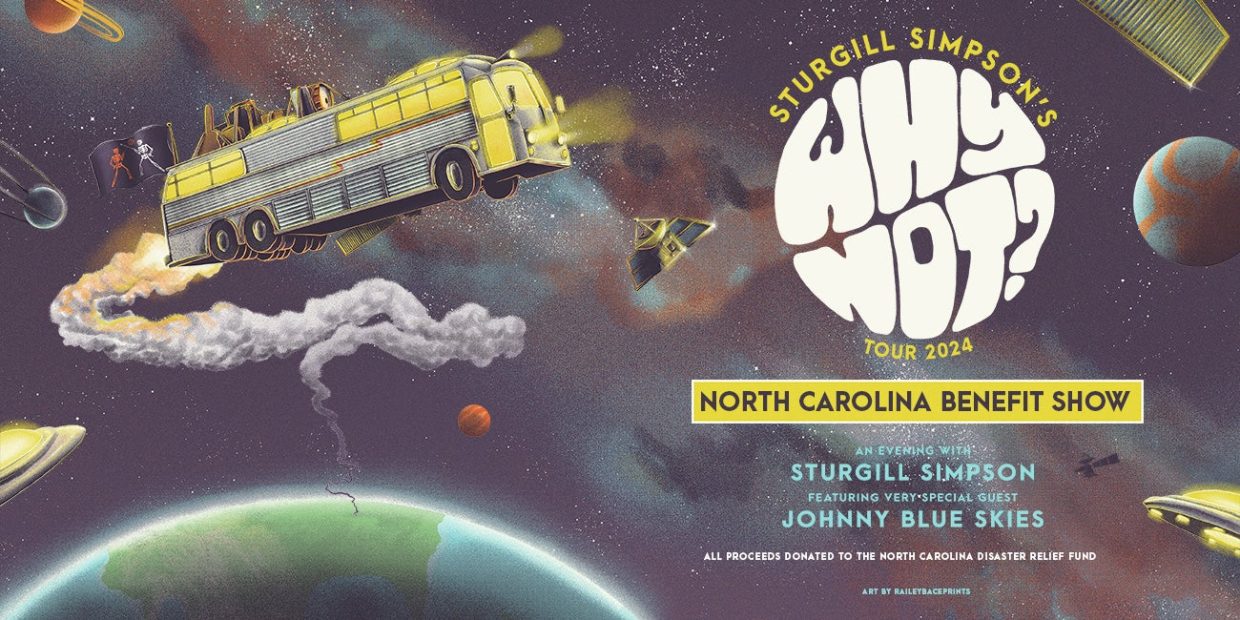
Mainstream country outlaw Sturgill Simpson has just announced his Why Not? tour – featuring his new project and persona, Johnny Blue Skies – will hold a special North Carolina Benefit Show on October 21 in Cary, North Carolina at the Booth Amphitheatre with all proceeds benefitting the North Carolina Disaster Relief Fund. Tickets go on sale this Friday, October 11 at this link. As explained in a press release announcing the event, Simpson was originally scheduled to perform at Asheville’s ExploreAsheville.com Arena on the same date, but due to the devastating impact of the storm, that show has been canceled. This quick-pivot rescheduled benefit show is just another indicator of how important North Carolina is to country and roots musicians.
Help Musicians Hasee Ciaccio and Abby Huggins Rebuild
View this post on Instagram
Hasee Ciaccio is a bluegrass bassist who has toured and performed with Molly Tuttle, Sister Sadie, Laurie Lewis, Alice Gerrard, AJ Lee & Blue Summit, and many, many more bands and acts in bluegrass, old-time, and string band music. She and her spouse Abby Huggins, a community builder, dancer, and artist, lost their home to Hurricane Helene-caused tree falls and mudslides.
The California Bluegrass Association has begun a fundraiser to help Hasee and Abby rebuild, as they must continue paying a mortgage on a home that became unlivable in an instant. The outpouring of generosity has been overwhelming, with 60% of their goal already being reached in the short time since the hurricane struck on September 27. Visit the CBA here in order to read more and donate to support Hasee & Abby.
Mandolinist Darren Nicholson and Band Pitch In
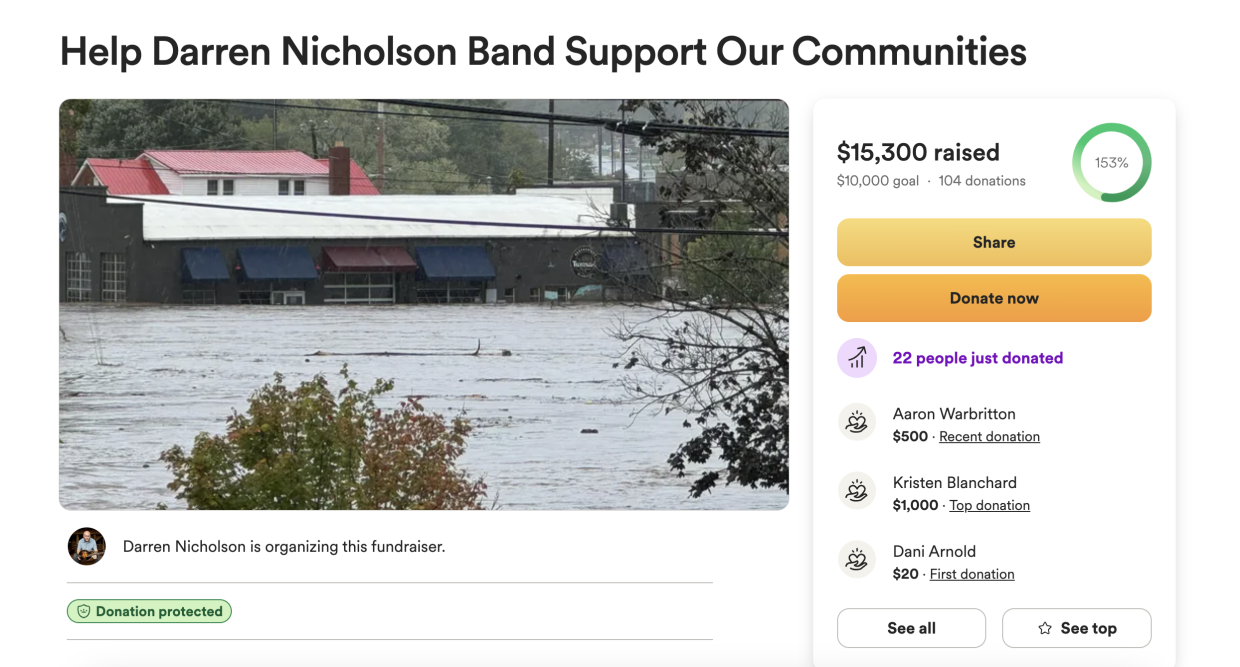
Darren Nicholson is a mandolinist, songwriter, and Western North Carolina native who knows first hand how floods of this nature can uproot entire lives and communities. In 2021, his home turf, Haywood County, was devastated by flooding from a tropical depression. He led recovery efforts then, and he’s pitching in again now – with his entire band pulling their weight to bring GoFundMe donations, supplies, and resources to their own communities in Western NC and East TN.
“The entire band is out serving their communities at this time,” Nicholson shares in the GoFundMe description. “Avery is a first responder doing search and rescue; Aynsley is distributing supplies in Unicoi, TN; Kevin is distributing water and fuel; Darren is cutting trees and distributing supplies in Haywood County, NC.”
If you’re able, you can give directly via GoFundMe to support Darren Nicholson and his band bringing glimmers of hope to their impacted communities. They’ve already exceeded their fundraising “goal” – and the dollars raised back in 2021 – but there is still much work to be done, so consider donating if you can.
BGS Contributor and Music Journalist Garrett Woodward Reports From on the Ground
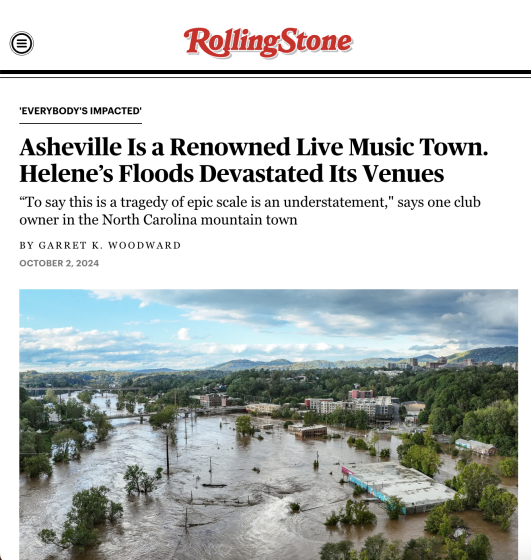
Frequent BGS contributor and freelance music journalist extraordinaire Garrett Woodward has been reporting – for RollingStone and others – from on the ground in the region about the impact on Asheville, North Carolina’s musicians and beyond. Despite dealing with power and internet outages himself, Woodward has been shining a light on the experiences of those dealing with the immense fall out of this storm.
We so appreciate Garrett keeping all of us in the loop with what’s happening on the ground, while spreading the word about relief efforts, resources, and donation pages. All of his stories above include many ways to give and to show up for North Carolina, so dig in and get involved.
Donate to the IBMA Trust Fund
View this post on Instagram
Hurricane Helene hit during IBMA’s World of Bluegrass business conference and IBMA Bluegrass Live! festival held in Raleigh, North Carolina. While the disruption to the event was not insignificant, the organization immediately began messaging more broadly about the impacts to the region and the destruction just down I-40, in the western parts of the state, in Tennessee, and Virginia.
Before the festival had even concluded, IBMA began fundraising through their Trust Fund, which supports bluegrass musicians and professionals facing hardships – whether financial, medical, disasters, etc. Members of the IBMA and its staff and board even already held a benefit livestream show. You can watch that performance here, and donate to the Trust Fund at any time as it supports bluegrass community members in need.
Help Ola Belle Reed’s Hometown Rebuild
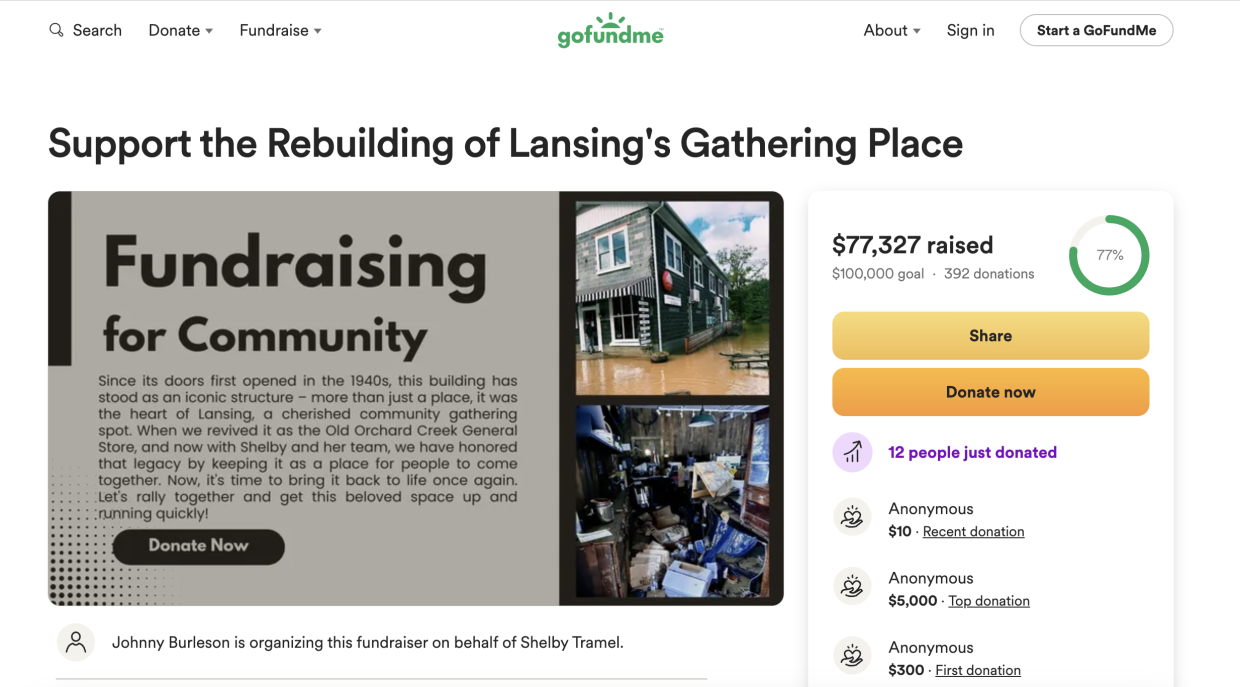
Ola Belle Reed’s hometown of Lansing, North Carolina is nestled in the mountains of Ashe County alongside Big Horse Creek. As you drive into the tiny village from the south, you’ll encounter a brightly colored mural of Reed on a local store’s brick wall, a bright barn quilt accenting a gorgeous portrait of this iconic old-time and bluegrass legend. Unfortunately, Helene took its toll on Lansing’s adorable little downtown too, flooding nearly every business and destroying homes, bridges, and livelihoods.
The Old Orchard Creek General Store, a newer business that had become an important community keystone and gathering place in its few short years of business, was almost entirely destroyed. The store is known for hosting nearby and regional musicians – like Cathy Fink & Marcy Marxer, Martha Spencer, Trevor McKenzie & Jackson Cunningham, and many more – on their porch and in their cute cafe, supporting dozens of area artists with a quality local gig. You can donate to support the general store’s rebuild here.
In addition, Lansing and the Ashe County area surrounding it are criss-crossed with mountain creeks and streams, many of which burst their banks and washed out bridges, driveways, and crossings that were critical for folks’ daily lives and safety. As a result, the citizens are banding together to rebuild this critical infrastructure for their neighbors. Give to help rebuild their roads, bridges, and driveways here.
Woody Platt’s Album Release Becomes Rescue Carolina
View this post on Instagram
Many folks are synonymous with the Western North Carolina music scene, but perhaps no single person epitomizes what it means to be a musical community member in Western NC like Woody Platt does. With a new album, Far Away with You, dropping this Friday, October 11, Platt has re-tooled his album release show to be a benefit for Rescue Carolina, raising money for local relief efforts in Brevard, NC and nearby. A bastion venue in the area, 185 King Street, will host the show – and they’ve been pitching in quite a bit with recovery themselves, too. Everyone is pitching in!
Not in the region? You can purchase a livestream ticket and still show up for Woody Platt and for Rescue North Carolina. Give directly to their GoFundMe here.
Star-Studded Concert for Carolina
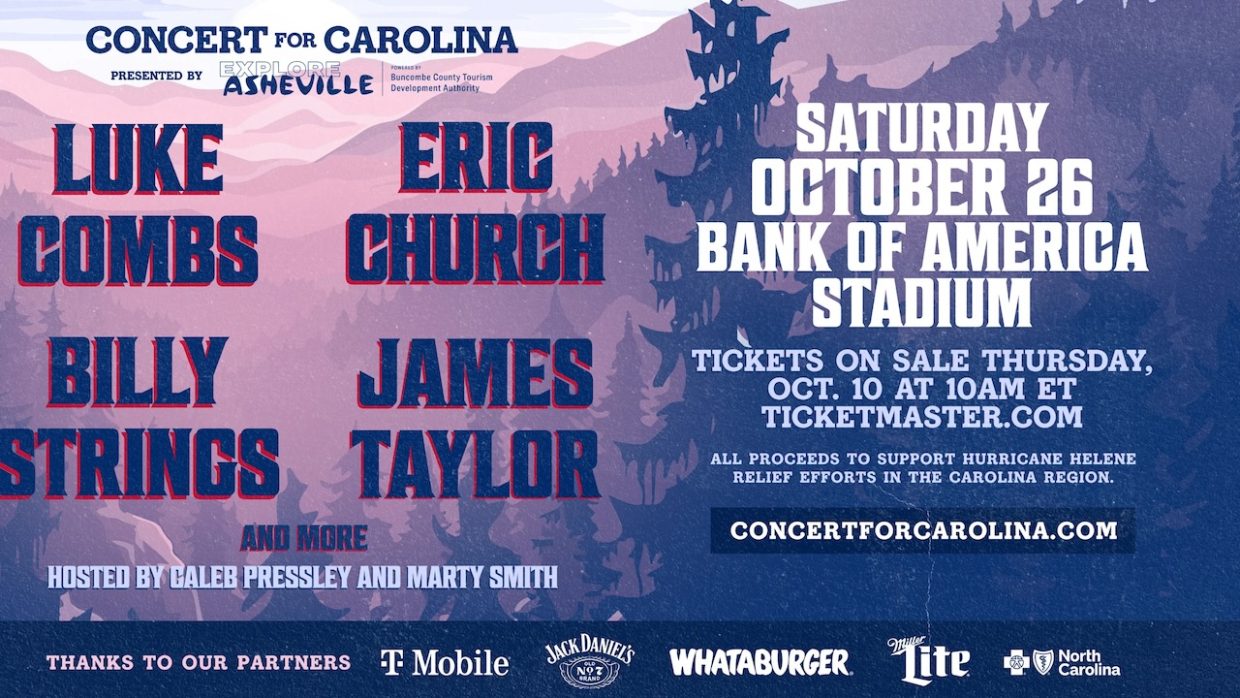
Announced yesterday, October 7, with tickets going on sale Thursday, October 10, Charlotte, NC’s Bank of America Stadium will be taken over on October 26 by Luke Combs, Eric Church, Billy Strings, James Taylor, Keith Urban, Sheryl Crow, and more for a star-studded benefit show. Proceeds will support relief efforts in the Carolinas. The event will be hosted by ESPN’s Marty Smith and Barstool Sports’ Caleb Pressley and will feature additional artists still to be announced. It’s sure to be a sell out – and for good reason!
Get more information and purchase tickets here.
Hiss Golden Messenger Dedicates Sanctuary Songs: Live in Omaha, NE to Western North Carolina
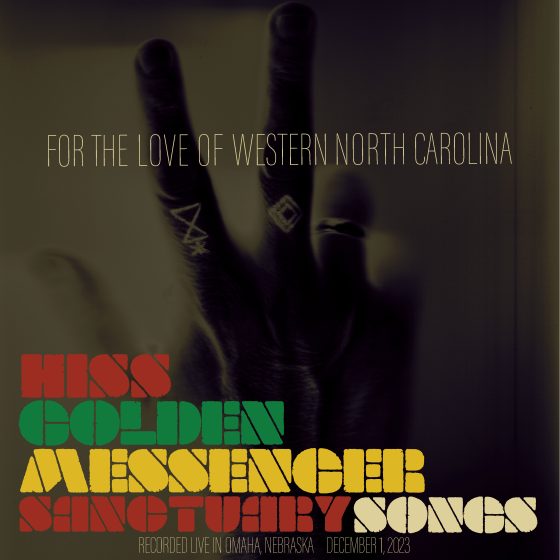
North Carolina-based indie, folk, and Americana artist Hiss Golden Messenger (AKA M.C. Taylor) has announced his upcoming live album, Sanctuary Songs: Live in Omaha, NE, will benefit BeLoved Asheville, a local organization raising funds for relief efforts. The 18-song project is available for purchase now exclusively via Bandcamp.
“Western North Carolina is really, really hurting, y’all,” Taylor noted on Instagram. “We don’t even know the half yet, and I’m glad to be able to help.”
Safe Water for Hurricane Helene Survivors Via LifeStraw
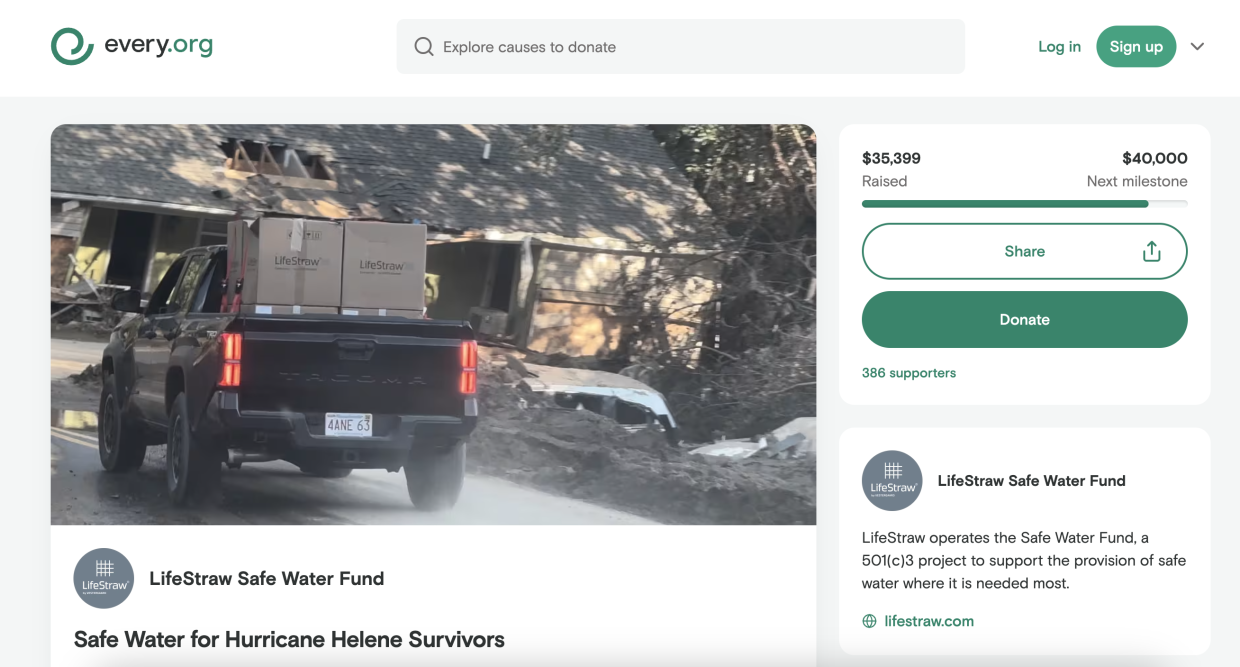
LifeStraw is a brand all about safe, clean water for all. Their products are popular with hikers, campers, outdoors people, and folks with limited access to clean water around the world. After Helene, the company activated their Safe Water Fund and their disaster response teams to bring their filtration products to those who’ve lost access to clean water. Donating directly to the fund helps bring their large purifier systems like the LifeStraw Community and LifeStraw 8L to the region as well as their LifeStraw Home pitchers and dispensers for use in homes and personal bottle and straw filters for individual use. Get more info and donate here.
Appalachian Aid Music Festival
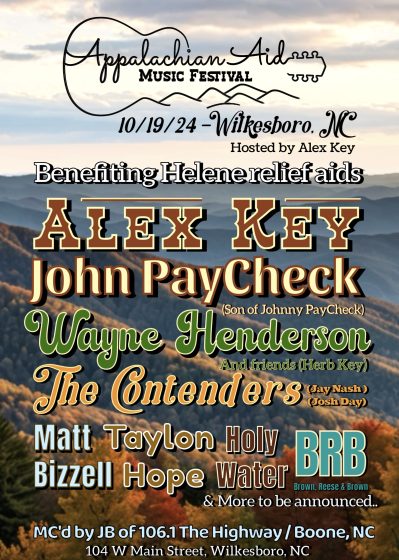
On October 19 in Wilkesboro, North Carolina, the Appalachian Aid Music Festival will feature performances by host Alex Key, John PayCheck (son of Johnny PayCheck), local great Wayne Henderson, and many more. The event will benefit Musicians Mission of Mercy, a non-profit embedded in rural Western North Carolina, specifically in Ashe County. Tickets are available now via Eventbrite, but first responders – nurses, doctors, firefighters, linemen, EMS, etc. – should know they’ll be admitted for free with their work IDs.
Cardinals At The Window Compilation Album
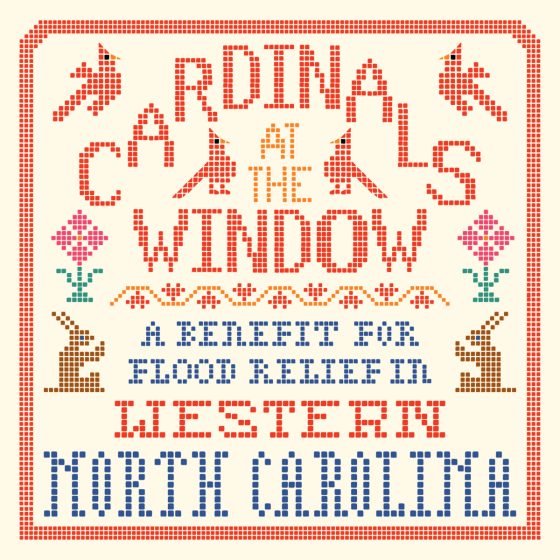
Released on October 9, Cardinals At the Window is a gargantuan compilation album of 136 tracks – yes, you read that right, 136 – submitted from various artists from across the roots music landscape. The project will benefit three non-profits based in Western North Carolina administering hurricane relief, Community Foundation of Western North Carolina, Rural Organizing and Resilience, and BeLoved Asheville. Compiled by Libby Rodenbough, David Walker, and Grayson Haver Currin, the album is available exclusively via Bandcamp and features tracks from amazing artists like Gillian Welch & David Rawlings, Hiss Golden Messenger, Watchhouse, Calexico, the Decemberists, Iron & Wine, MJ Lenderman, Mipso, Jason Isbell, Tyler Childer, Waxahatchee, Yasmin Williams, and many, many more.
Purchase the project and support the cause here.
Appalachian Allies
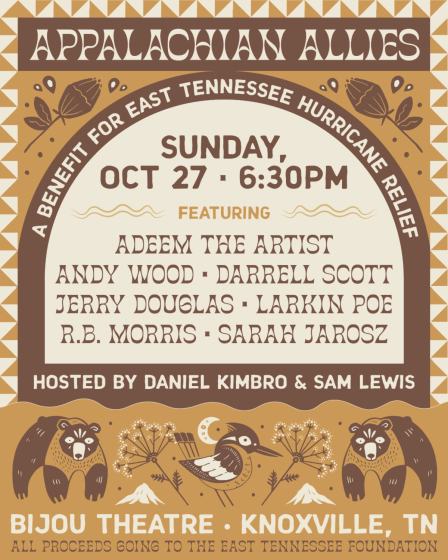
On October 27 at the Bijou Theatre in Knoxville, Tennessee an impeccable lineup of roots musicians will gather to raise funds for the East Tennessee Foundation, a non-profit committed to supporting flood victims and flood relief programs in the mountains of East Tennessee. Hosted by bassist Daniel Kimbro and singer-songwriter Sam Lewis, the event will feature performances by Adeem the Artist, Darrell Scott, Jerry Douglas, Larkin Poe, Sarah Jarosz, and more. Tickets are on sale now. Make plans to support Tennesseans by showing up and showing out for Appalachian Allies on October 27.
“Hell in High Water” – Mike Thomas
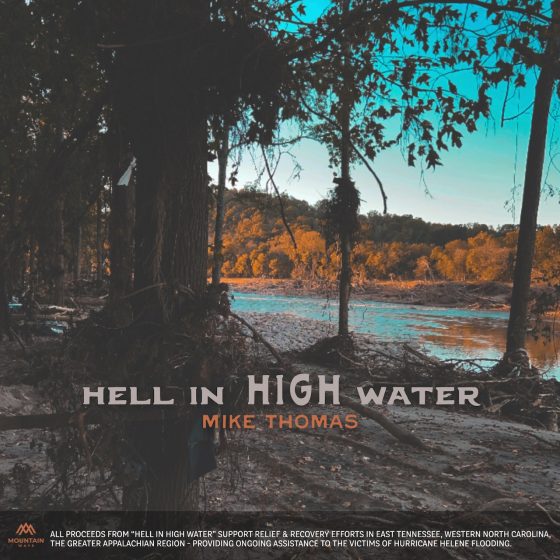
Singer-songwriter Mike Thomas grew up in East Tennessee. After Helene tore through his home state, the Carolinas, and Virginia, he began writing “Hell in High Water” in early October.
“For generations, my family has called East Tennessee home, and although I have lived in Nashville for 20 years, I will always be an East Tennessean. Watching the aftermath of Helene unfold affected me deeply…” Thomas said via press release. “I couldn’t get those heartbreaking stories and images out of my mind.”
So, he wrote “Hell in High Water,” recorded it in record time, and released the track with all proceeds going to Mountain Ways, a non-profit committed to providing ongoing hurricane relief and assistance in the region. “I started writing ‘Hell in High Water’ on October 4th and finished it on October 6th,” Thomas continues. “I played it for some close friends and family who urged me to record and release it as soon as possible. I sent it to my producer, Tres Sasser, and my bandmates. Everyone dropped what they had planned to record the track on October 17th. There was a sense of urgency and purpose to get the song done and to get it done right.”
The song is now available to stream via Spotify, Apple, and more. Listen to the track below. All proceeds will go to hurricane relief. Listeners and fans can also donate to Mountain Ways directly here.
Our Co-Founder, Ed Helms, Agrees
View this post on Instagram
Even our co-founder himself, Ed Helms, took to social media to point out how special and important this region of the country is to all of us – BGS and beyond. Like many of us, Ed has had a lifelong relationship with the mountains of Western North Carolina and he understands personally how difficult this recovery process will be. You can find all of the links he mentions in this clip and more below.
Whatever you have to give and contribute to rebuilding after this storm, nothing is too small or insignificant. It will take all of us to rebuild Central and Southern Appalachia and the entire Southeast post-Helene.
Give to the Appalachian Funder’s Network here.
Give to World Central Kitchen here.
Support Operation Airdrop, Concord, NC
For more donations to local, vetted organizations, Blue Ridge Public Radio has compiled this list.
(Editor’s Note: Have a fundraiser, link, benefit concert, or similar hurricane recovery resource you’d like us to share here? Email us at [email protected].)
Photo Credit: Courtesy of NASA Image and Video Library. Sept. 25, 2024 – Hurricane Helene is pictured from the International Space Station as it orbited 257 [miles] above the Gulf of Mexico off the coast of Mississippi.
Out Now: Palmyra
Palmyra is one of those bands you discover and can’t help but continue to come back to. They are not easily forgotten. They write lyrics that are poetic while being relatable – a duality that is not easy to accomplish.
The musicality of these three highly skilled instrumentalists – Teddy, Manoa, and Sasha – is strong and their energy is quirky, fun, and engaging. Lately, they’ve been touring all over the East Coast, recording, working with artists like Liv Greene and Jobi Riccio, who was previously featured on our column. If you can’t tell yet, the queer music industry is incredibly small and interconnected!
Palmyra uses their innovative songwriting and performance skills to transform traditional folk instruments and three-part harmonies into something you’ve never heard before. We hope you enjoy our Out Now interview featuring Palmyra.
(Editor’s Notes: Interview answers supplied by Sasha Them)
Who are your favorite LGBTQ+ artists and bands?
Among my absolute favorite things about our touring over the last few years are the moments that we get to share stages with other queer artists. Liv Greene is a personal favorite mine; all of their songs exist in their own world of brilliance and masterful craft. Brittany Ann Tranbaugh has songs that absolutely wreck me. Another artist that’s constantly on repeat in the van for us is Brennan Wedl! Their song “Bag of Bones” is one of the most incredible songs I have ever heard and turns me into a pulp every single time I revisit it.
For anyone reading this who might not be out of the closet, were there any specific people, musicians, or resources that helped you find yourself as a queer individual?
Yes! I am an out-and-proud queer person now, but it took quite a while to settle into the person I am today. There are so many artists that helped move the needle for me; particularly the abundance of queer and trans folks I connected with online during the lockdown. Backxwash is top of the list for me; she’s a killin’ rapper and producer based out of Canada and her music helped me to understand that as artists we can channel complicated emotions and inner turmoil to create something empowering and badass and beautiful.
What are your release and touring plans for the next year?
Touring has been our full time job for two-and-a-half years now, and we plan on continuing to hit the road in full force in 2024. Our hope is to branch out to some new regions and cities, and I am sure we’ll be visiting all of our favorite places along the East Coast, from Maine to Georgia. Now that I say that, I’m realizing that, as a band, we kind of follow the Appalachian Trail in our tour routing…
We’ve got two more singles coming out this year, and are planning on putting out a few projects in 2024. I am so excited to share the music we’ve been working on.
This year, you’ve been sharing stages with bands like Watchhouse, playing festivals, and touring all over the East Coast of the U.S. What has that been like for you?
This year has definitely been our wildest one yet. Some of the experiences we’ve had, like opening for Watchhouse, have been so surreal to me. It feels like the work we’ve been putting in for so long has started to pay off in very real ways. Getting to play Newport Folk Festival is one of the highest honors any of us have ever had and it is beyond cool to get to connect with folks all over just by doing the thing we all love most – playing and writing songs.
What does your songwriting process look like? You have incredibly strong lyrics that are both relatable and poetic. Do you map out the structure and content of the song first? Do you think about song structure and tools like prosody, lyrical placement, and rhyme types? Do you spend a lot of time editing?
The songwriting process looks pretty different for all three of us, but each song typically starts with one writer and then is brought to the group to arrange and flesh out. There’s a very special (and sometimes uncomfortable) moment that has to happen when one of us brings a song to the group; you have to be able to release ownership of the thing you’ve created so that it can become a collective version that everybody has had their hands on.
For me, I usually start with one line that comes to me when I’m away from any instruments – typically when I’m out driving or walking! I am very particular about what words feel good coming out of my mouth and what feels the most authentic to my own personhood. Prosody and internal rhyme schemes are almost always on my mind, especially when I’m reworking a tune. I love getting into the nitty gritty parts of a song, and I love the moment I am able to zoom out when a song is finished and take care to make sure everything fits together.
Photo Credit: Joey Wharton
Out Now is a partnership of Queerfest and BGS authored by Queerfest founder and director Sara Gougeon.
WATCH: Rachel Baiman, “Young Love” (Live)
Artist: Rachel Baiman
Hometown: Nashville, Tennessee
Song: “Young Love” (Live)
Album: Common Nation of Sorrow Deluxe Edition
Release Date: December 1, 2023
Label: Signature Sounds
In Their Words: “Sometimes songs I’ve written become less relevant and relatable for me over time, but this one has seemed to stick and grow with me, such that I reach for it during live shows, often as a closer. I’m grateful for the chance to re-present it with two of my favorite musicians!
“This version of ‘Young Love’ was recorded live in Knoxville with Andrew Marlin and Josh Oliver of Watchhouse. They have such distinct voices, vocally as well as on their instruments, and it’s amazing to hear this song transformed under their influence. Andrew and Josh helped launch my solo career with the album Shame, and just like this song I have continued to love their music and learn from them over time.” – Rachel Baiman
Track Credits: Written by Rachel Baiman.
Performed by Rachel Baiman, Andrew Marlin, and Josh Oliver.
Engineered by Kaitlyn Raitz and Ben Plotnick.
Mixed by Sean Sullivan.
Mastered by Jon Neufeld.
Photo Credit: Natia Cinco
Video Credits: Owen Scarlett Productions, Owen Scarlett and Charissa Kroeger
Fiddles in February: Punch Brothers, Watchhouse, and More BGS Videos
At the Bluegrass Situation, we are fond of the fiddle! Sometimes its nuance will get overshadowed by the acoustic guitar or the banjo, but in our hearts, the fiddle always holds its own. Can it rouse a crowd of country fans in a dancehall in Texas? Yes. Can it make you weep when you hear it on an Alison Krauss record? Every time. Will we ever get tired of hearing “Orange Blossom Special”? Can’t even imagine that.
Throughout the month of February, we’re shining a light on some of our favorite fiddle content, like this excerpt from Mark O’Connor’s upcoming memoir, this Mixtape from Turnpike Troubadours’ Kyle Nix, or this interview with Becky Buller. It also seems like the right time for a (double) stop by our BGS archive. Here are five of our favorite clips along with a brand new BGS playlist at the end.
Jason Carter, “King of the Hill”
One of our newest videos finds Jason Carter and friends jamming in the Station Inn dressing room, just before an album release party at Americanafest. Joining him on this Bruce Hornsby song are Cody Kilby (guitar), Ashby Frank (mandolin), Cory Walker (banjo), and Alan Bartram (bass). Carter told BGS, “This song is for anyone who’s ever had a dead-end job or had a boss like a prison warden.”
Che Apalache, “Red Rocking Chair”
Joe Troop of Che Apalache brings an international flair to the fiddle, balancing his North Carolina upbringing with a South American history lesson. How does he bridge the gap? Find out in our BGS interview from 2018.
Watchhouse, “Hey Adam”
On their very first trip to Los Angeles in 2014, Watchhouse (then Mandolin Orange) shared a special performance of “Hey Adam.” The poignant narrative of the song, written by Andrew Marlin, is beautifully underscored by the elegant harmony and gentle fiddle of Emily Frantz. In 2019, we caught up with the duo for this BGS Cover Story.
Punch Brothers, “My Oh My / Boll Weevil”
You can count on Punch Brothers to consistently deliver something cool, even if you can never predict what they’re going to do next. Back in 2015, BGS filmed the guys outside of the Fonda Theater in Hollywood, California. A few years later, in 2018, we interviewed all five members individually for our Artist of the Month series. During our visit, fiddle player Gabe Witcher shared his childhood memories of meeting a very young Chris Thile at Follows Camp Bluegrass Festival and even playing with Bill Monroe at Strawberry Bluegrass Festival.
Sara and Sean Watkins, “You and Me”
The Bluegrass Situation emerged from the West Coast acoustic scene, so we have to give props here to California natives Sara Watkins and Sean Watkins. They’ve been friends of BGS from the beginning and we’re always delighted to follow along on their creative journeys. That includes the time we ushered them into a tiny gondola in Colorado, resulting in this wonderful 2014 live video of “You and Me.” We’re thrilled about the new Nickel Creek record coming in April, which follows Watkins Family Hour’s terrific collection (and conversation) last fall.
BGS Top 50 Moments: Newport Folk Festival
Dylan going electric in 1965. Lomax making his historic archive recordings in 1966. Joni taking the stage after 50-something years in 2022. Newport Folk is a festival full of milestone moments and lots of surprises. And for a brief moment in time in 2014, BGS was a small part of Newport Folk Fest’s long and storied history too, when we presented our Bluegrass Situation Workshop Stage inside the intimate Whaling Museum building on Sunday at the Fort.
Amidst a festival lineup that included such stalwarts as Nickel Creek, Trampled by Turtles, Dawes, Valerie June, Hozier, Jack White, and Mavis Staples, the BGS crew – helmed by co-founder Ed Helms and his Lonesome Trio bandmates Ian Riggs and Jake Tilove – hosted a few “up and coming” acts we were very excited about, singing songs about significant “firsts” in their lives. Some of those young whippersnappers you might have heard of, like Shakey Graves (joined by Chris Funk of the Decemberists and Langhorne Slim), Aoife O’Donovan, Wilie Watson (with special guest Sean Watkins), and Watchhouse (who were still going by Mandolin Orange at the time), which marked Andrew and Emily’s very first – but certainly not last – appearance at Newport.
That big “first” for us was significant – to be welcomed into the “Folk” Family and made to feel like we were all part of something big and wonderful. And it’s that feeling that’s brought us back to the Fort year after year ever since.
Photos by Samara Vise

